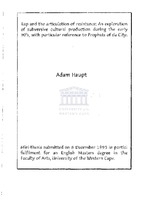| dc.description.abstract | This thesis explores the ways in which Cape Town rap group Prophets of da City articulate their resistance to apartheid and, in particular, the ways in which they attempted to intervene in politicians' attempts to pacify the black electorate during the build- up to South Africa's first democratic elections. Initially, I attempt to clear a space from which one could discuss POC's work as postmodern and postcolonial. I then theorise POC's use of sampling as a postmodern strategy whilst, at the same time, pointing out that rap has its origins in the African- American tradition of Signifyin(g). Through my discussion sampling, I suggest that rap, as postmodern cultural practice, challenges concepts of originality as well as uniqueness. I also discuss POC's work as part of subculture and analyse Spike Lee's Do The Right Thing in order to explore the black artist's struggle for space* within the public sphere. Finally, I contend that both Lee and POC's texts are flawed because they marginalise gender politics. I briefly discuss Queen Latifa's rap music to suggest that the discourses of race and gender are inseparable. | en_US |

